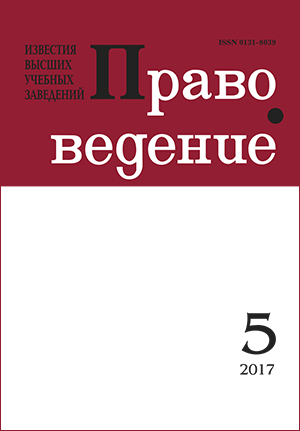On the debtor’s freedom limitation in the enforcement procedure
Abstract
The article deals with the issue of efficiency of limitations of the debtor’s personal rights as applied in the enforcement procedure. The low level of actual enforcement determines new attempts to introduce additional penalties and other similar measures in relation to the debtor. However, formation of enforcement measures is not always executed in a systematic manner. Such measures are required to be systemized and differentiated. A well-structured, theoretically founded and pragmatic system of execution in the enforcement procedure is to be created. Taking into account the analysis of the legislation and the legal practice, as well as statistical data, historical and foreign experience, the author makes the conclusion that, first, the key problem of efficiency of relevant measures is connected with determining the bad faith o the debtor; second, the limitation of the debtor’s freedom should be applied as a penalty subject to the proper legal guarantees associated with the legal liability mechanism. The author points out that the debtor acting in bad faith should be subject to the public liability and the limitation of his/her freedom should be imposed as a penalty according to the procedure established by law taking into account the relevant legal guarantees. If the enforcement procedure considers that all debtors act in bad faith, it will per se shift to “quasi” criminal law, and bailiffs will turn into police officers. Thus, liability measures will substitute “classical” enforcement measures where passive behavior of the debtor is replaced by enforcement authorities which hand the object of enforcement over to the creditor.
Keywords:
enforcement procedure, debtor’s rights, good faith, liability, limitation of rights, constitutional framework of enforcement
Downloads
References
Downloads
Published
How to Cite
Issue
Section
License
Articles of "Pravovedenie" are open access distributed under the terms of the License Agreement with Saint Petersburg State University, which permits to the authors unrestricted distribution and self-archiving free of charge.




